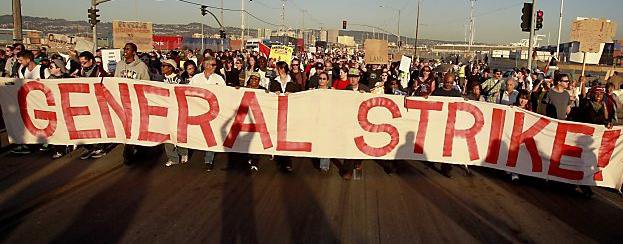by Mark Vorpahl
Echoing the story of David vs. Goliath, janitors in Houston are on strike and taking on such corporate giants as JPMorgan Chase and Exxon Mobil in an effort to pressure the janitorial companies they employ to agree to the workers’ modest demands. It is these big business behemoths that are the real powers behind cleaning contractors such as ABM, GCA, ISS etc. By striking against these contractors, and publicly targeting these contractors’ employers, the janitors are using their collective power in a showdown that has great significance for not only the Labor Movement but all workers.
The janitors are members of Service Employees International Union (SEIU) Local 1, which has a membership of 3,200 in Houston. Currently, these workers’ wages top out at $8.35 per hour. On average, they make under $9,000 a year. The government defines the poverty line as an income of $22,314 for a family of four and $11,139 for an individual.
The janitors are asking for a $10.00 per hour starting wage. In response, the contractors offered a combined 50 cents an hour raise over the course of a five-year contract. With the growing cost of living over this time, these workers would sink even further into poverty if they accepted this. The contractors’ proposal was nothing more than an insult.
Not content with merely insulting their employees, the contractors began to back up their position with injury. The janitors were subject to captive audience meetings where their jobs were threatened if they participated in union activity. Management warned that they would call for an immigration audit if the employees didn’t quiet down. In addition, they also withheld paychecks of some union supporters. In all, 13 Unfair Labor Practices have been filed with the National Labor Relations Board.
The Union contract expired on May 31st. The janitors held a series of rallies and one-day work stoppages in order to convince management that they meant business. However, because these actions did not seriously impact the contractors’ profits, they did not feel compelled to move. Consequently, the membership of SEIU Local 1 had no choice but vote to go on strike.
There are two features of this strike that make it exceptional.
One is how it highlights the growing inequality that exists in this nation and the need to fight it. Houston leads the nation in the growth of the number of millionaires. The companies targeted by the strike in its public campaign are some of the main players in the big business elite. On the other hand, not even the most rabid right-wing pro-corporate media can effectively portray the janitors as greedy unionists. This strike has the potential to tap into a growing discontent in the U.S. over inequality that helped launch Occupy as well as the Madison, Wisconsin Capitol occupation in 2011.
The other exceptional feature of this struggle is the use of work stoppages and rallies nationally in solidarity with the Houston janitors. The Solidarity Strike was one of the tactics employed by the CIO in the 1930s that propelled its rapid growth. Because of the effectiveness of this tactic, it was outlawed in 1947 with the bipartisan passage of the Taft-Hartley Act.
To get around the rigged rules of this slave labor law, many SEIU janitorial contracts have a “conscience clause.” This clause enables janitors to refuse to cross a picket line at their workplace without fear of penalty. As a result, picket lines have been set up in several cities at work sites that employ SEIU janitors, elevating the economic impact on the contractors, who are in Houston, to a national scale.
These contractors and their corporate employers are organized to pursue profits across the U.S. These profits are the only thing they care about. While they can more easily handle a strike isolated in one city, the nationwide solidarity work stoppage tactic employed by SEIU is much more difficult for them to deal with. If the bosses refuse to budge, it will be necessary to escalate this tactic further.
By highlighting the issue of inequality and countering the contractors with a nationwide response that uses work stoppages, SEIU is challenging the limits of the corporate political machine. It will be necessary to break these boundaries for Houston’s janitors, and all workers, to decisively win.
Currently, some Democratic politicians, such as Vice President Joe Biden, have voiced support for the strike. Given the massive funding both parties receive from Wall Street and the resulting pro-corporate policies they pursue, there should be no surprise that they either neglect or attack the issues of most importance to workers, so that such fine speeches as Biden’s have the appearance of cynical electioneering.
SEIU, and the unions in general, will not find a national voice by getting a seat at the table with these politicians who ignore or attempt to bind the membership’s struggles. Instead Labor must devote its resources towards empowering its own members to fight for their own needs, without fear of offending the politicians, and create a social movement that speaks for all workers.
The demands that the Houston SEIU janitors are putting forward are extremely modest. However, their actions and organizing are growing more bold. They are already providing an example of greater struggles for economic justice in the near future.
For more information and to support the strike go to http://www.seiu1.org/.







